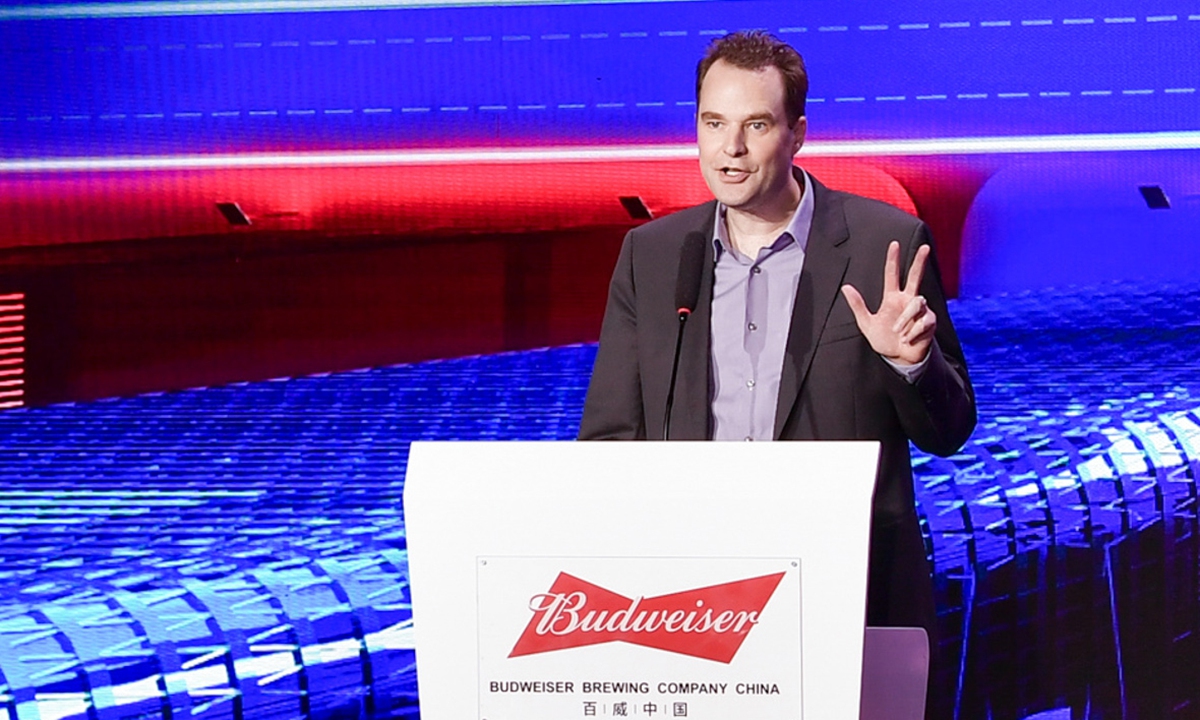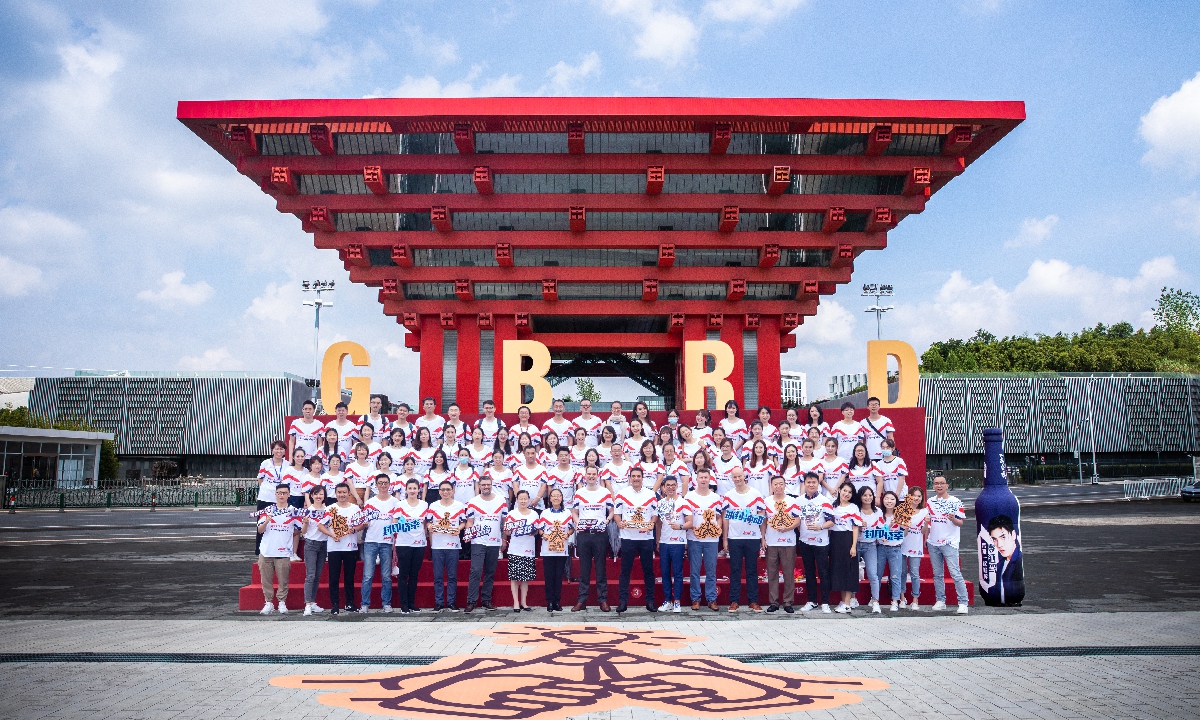Smart Drinking keeps going
Budweiser promotes zero drink-driving future among Gen-Zers with e-sports languages

Jan Craps, CEO and Co-Chair of Budweiser APAC, delivers a speech at the event. Photo: Courtesy of Budweiser
With an immersive opening show that brought guests into an exciting world of e-sports, Budweiser unveiled its "Smart Drinking, No Drink-Driving" campaign in downtown Shanghai on September 15, a corporate social responsibility program that the company has been dedicated to for 13 years to promote public awareness of the dangers of drink-driving.
It is the first time that the company has infused the campaign with e-sports, a passion point of Gen-Zers, in the hope of better engaging young groups through their shared interest, calling on more people to join the cause, and inspiring a future of zero drink-driving, said Jan Craps, CEO and Co-Chair of Budweiser APAC.
It has integrated the languages of e-sports into Harbin Beer (also known as HAPI), a popular brand for young people in China, to educate young people to respect the rules, be responsible, stay strong-willed and avoid being impulsive.
Craps believes that Gen-Zers, born into a fully digital era, are much more digital and tech-savvy than other generations, and are more outgoing and more expressive in what they think and feel.
"Therefore, for them, a brand has to stand for something, and to interact with them, which is one of the reasons that Harbin Beer talks to the passion point of these consumers, e-sports, and tries to bring on an awareness of no drink-driving," Craps told the Global Times, noting that starting education and changing norms at an early age when the young generation starts consuming alcohol will bring long-term benefits for the next generation.
In 2020, Budweiser invited Wang Ziyi, a new-generation Chinese idol with a positive image and huge influence, to be a smart drinking ambassador.
"The young can get influenced from the example that they look up to," Craps said.

Matt Che, VP Marketing of Budweiser APAC, Frank Wang, Chief Legal and Corporate Affairs Officer of Budweiser APAC, and other guests release an e-sports-themed public awareness film. Photo: Courtesy of Budweiser
The real-life idol and Hajiang, HAPI's virtual idol, as well as Shanghai's first virtual ambassador for road traffic safety awareness, featuring this year's public awareness film, champion Budweiser's idea of zero drink-driving future with e-sports languages.
In the public awareness film launched at the event, Wang, assuming the lead role of a die-hard e-sports fan, traveled into the virtual e-sports world. He defeated the temptation to drink and drive with e-sports stunts as he was hesitating to drive after drinking. Hajiang then arrives on his side as a designated driver.
Harbin Beer's non-alcoholic beer, a new product released at 2019's event, is another star of Budweiser's campaign. The beer, brewed through a unique process of precision dealcoholization which reduces the alcohol content as much as possible while still keeping the rich taste of traditional beer and a stronger wheat fragrance, has been well-received among consumers, according to Craps.
The NABLAB (no alcohol beer and low alcohol beer) portfolio addresses the growing consumer trends of moderation, health and wellness, and gives alternative smart choices for changing social norms, Craps said, adding that the company has set up a smart drinking goal of having low alcoholic and non-alcoholic beer represent more than 20 percent of all the beer they sell worldwide by 2025.
The brewing industry has been badly affected by the COVID-19 pandemic, as stores and factories were closed to curb the coronavirus. After a slowdown in the first quarter, Budweiser saw a strong recovery in the Chinese market in the second quarter as the country brought the coronavirus under control and stores and factories resumed operations, according to Craps.
"From April to June, our volume was more or less back to normal. And in June we had the biggest month ever in the China market and saw a strong rebound," Craps said, adding that China is the market that came out of the pandemic first and in the best way so far.
Budweiser has been leading the premium segment and super premium segment in China's brewing market, according to Craps, who is optimistic about market prospects in China in the segments that it has long been focusing on.
"The premium and super premium beer currently take 16 percent of the beer market in China, a giant one, but also sees potential as in some countries, like South Korea and the US, the market share goes up to 25 percent to 40 percent," he said.
China is one of Budweiser's top four markets, according to Craps. "We have a very long-term lens in China and we will continue to invest and continue to lead the premium segments and bring new innovations to expand our portfolio," he said.

Budweiser unveils its "Smart Drinking, No Drink-Driving" campaign in Shanghai. Photo: Courtesy of Budweiser
Craps has observed several trends that appeared during the pandemic, one of which is consumption on premiumization.
"The premiumization continued to accelerate. We saw the super premium segment go very healthily and was the best performing segment in China, with people still spending on the super premium products," Craps said.
Notably, the digital channel of Budweiser grew strongly by double digits during the pandemic, as people spend more time online when staying at home and home delivery has become more convenient, said Craps, noting that the company will focus more on the digital channel to expand its business.
He believes that the COVID-19 pandemic has also accelerated the trend of people maintaining a healthier lifestyle, and it is more of an opportunity than a crisis for Budweiser.
He said it is important that the company adapt its product portfolio to options for people who want to change and moderate their alcohol intake.
"That's why the smart drinking campaign is important because we want to educate people to change the social norms, not consume too much in one go and to be responsible when they consume alcohol," he said.